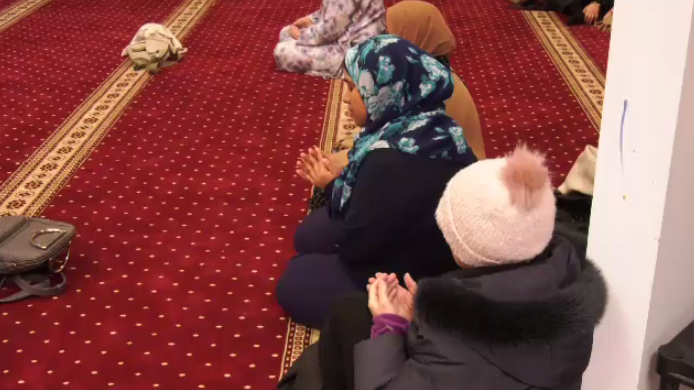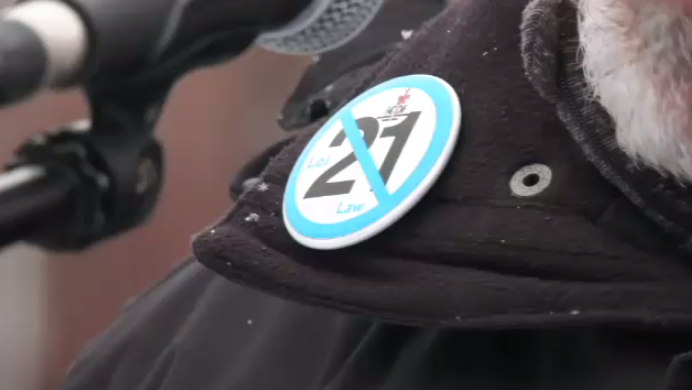'The sorrow doesn't go away:' Commemoration for victims of Quebec City mosque shooting
Montrealers gathered Friday to commemorate victims of the Quebec City mosque shooting nearly six years ago.
Afternoon prayers at the Verdun Islamic Centre also included a moment of reflection for those killed in the 2017 attack.
"Believe me, the sorrow doesn't go away. Yes, we life our live and this is nature. But the sorry is in our hearts everyday," said Samer Mazjoub, president of the Canadian Muslim Forum.
On Jan. 29, 2017, six men were killed and five critically injured shortly after evening prayer at the Quebec City Islamic Cultural Centre.
The victims were professor Khaled Belkacemi, 60; pharmacy worker Aboubaker Thabti, 44; grocery store owner Azzeddine Soufiane, 57, the owner of a local grocery store; accounting technician Mamadou Tanou Barry, 42; computer analyst Abdelkrim Hassane, 41; and IT worker Ibrahima Barry, 39.
The gunman, who was 27 at the time, pleaded guilty to the murders in 2018.
The shooter told police he felt compelled to act for fear that immigrants would kill his family, and told psychiatric evaluators he "wanted glory."
A judge said the shooter had a "visceral hatred for immigrants who are Muslims."
 Afternoon prayers at the Verdun Islamic Centre on Jan. 27, 2023 included a moment of silence for those killed in the 2017 Quebec City mosque shooting. (CTV News/Kelly Greig)
Afternoon prayers at the Verdun Islamic Centre on Jan. 27, 2023 included a moment of silence for those killed in the 2017 Quebec City mosque shooting. (CTV News/Kelly Greig)
For Ahmed Chihane, president of the Verdun Islamic Centre, the tragedy is a painful reminder of the reality many Quebec Muslims face.
"[It's] the problem of Islamaphobia here in Quebec, which is rising every day," he said.
According to Montreal police, the number of hate incidents based on religion rose from 32 to 40 between 2020 and 2021.
And in Quebec City, the number of hate crimes rose for the fourth year in a row.
"This might happen to any one of us," Chihane concluded.
For this reason, Friday's event was more than a commemoration -- it was a call to action.
"Bringing everyone here in front of the mosque to talk about the actions we can do to counter Islamophobia is really important," said Stephen Brown, CEO of the National Council of Canadian Muslims.
Those actions include addressing racial profiling by authorities like police, and creating better tools to help people report intimidation or hate crimes.
According to Brown, many are also hoping for changes to Quebec's secularism law, Bill 21.
 A speaker wears an anti-Bill 21 pin at a Montreal commemoration on Jan. 27, 2023 for victims of the 2017 Quebec City mosque shooting. (CTV News/Kelly Greig)
A speaker wears an anti-Bill 21 pin at a Montreal commemoration on Jan. 27, 2023 for victims of the 2017 Quebec City mosque shooting. (CTV News/Kelly Greig)
"A major source of public tension right now is Bill 21," said Brown. "In a situation where it allows you to take people's rights without justifications means we don't have rights, we have permissions."
Bill 21 prohibits government employees from wearing religious symbols, including head and face coverings.
Many religious groups and civil rights advocates have argued the bill disproportionately affects racialized and immigrant groups, particularly Muslim women.
But the Quebec government has maintained that the law is "reasonable."
Quebec Premier Francois Legault has also denied claims that Islamaphobia is an issue in Quebec.
However, many members of the Muslim community feel differently.
"We should not beg for tolerance and acceptance," said Mazjoub of the Canadian Muslim Forum. "We are citizens. To make a whole community feel like they need to beg for tolerance and acceptance is extremely bad."
CTVNews.ca Top Stories

BREAKING Honda to get up to $5B in govt help for EV battery, assembly plants
Honda is set to build an electric vehicle battery plant next to its Alliston, Ont., assembly plant, which it is retooling to produce fully electric vehicles, all part of a $15-billion project that is expected to include up to $5 billion in public money.
BREAKING New York appeals court overturns Harvey Weinstein's 2020 rape conviction from landmark #MeToo trial
New York’s highest court on Thursday overturned Harvey Weinstein’s 2020 rape conviction, finding the judge at the landmark #MeToo trial prejudiced the ex-movie mogul with improper rulings, including a decision to let women testify about allegations that weren’t part of the case.
1 arrested in northern Alberta during public shelter order
Residents of John D'Or Prairie, a community on the Little Red River Cree Nation in northern Alberta, were told to take shelter Thursday morning during a police operation.
Secret $70M Lotto Max winners break their silence
During a special winner celebration near their hometown, Doug and Enid shared the story of how they discovered they were holding a Lotto Max ticket worth $70 million and how they kept this huge secret for so long.
Remains from a mother-daughter cold case were found nearly 24 years later, after a deathbed confession from the suspect
A West Virginia father is getting some sense of closure after authorities found the remains of his young daughter and her mother following a deathbed confession from the man believed to have fatally shot them nearly two decades ago.
Monthly earnings rise, payroll employment falls: jobs report
The number of vacant jobs in Canada increased in February, while monthly payroll employment decreased in food services, manufacturing, and retail trade, among other sectors.
First in Canada procedure performed at London, Ont. hospital
A London man has become the first person in Canada to receive a robotic assisted surgery on his spine. Dave Myeh suffered from debilitating, chronic back pain that led to sciatica in his right now and extreme pain in his lower back.
Doctors say capital gains tax changes will jeopardize their retirement. Is that true?
The Canadian Medical Association asserts the Liberals' proposed changes to capital gains taxation will put doctors' retirement savings in jeopardy, but some financial experts insist incorporated professionals are not as doomed as they say they are.
Something in the water? Canadian family latest to spot elusive 'Loch Ness Monster'
For centuries, people have wondered what, if anything, might be lurking beneath the surface of Loch Ness in Scotland. When Canadian couple Parry Malm and Shannon Wiseman visited the Scottish highlands earlier this month with their two children, they didn’t expect to become part of the mystery.






























